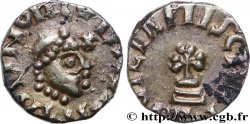v38_1678 - AURELIANORUM CIVITAS - ORLÉANS (Loiret) Denier, MARTINVS monétaire
MONNAIES 38 (2009)
Starting price : 480.00 €
Estimate : 750.00 €
Realised price : 792.00 €
Number of bids : 2
Maximum bid : 935.00 €
Starting price : 480.00 €
Estimate : 750.00 €
Realised price : 792.00 €
Number of bids : 2
Maximum bid : 935.00 €
Type : Denier, MARTINVS monétaire
Date: c. 700-725
Mint name / Town : Orléans
Metal : silver
Diameter : 10,5 mm
Orientation dies : 6 h.
Weight : 1,23 g.
Rarity : R2
Coments on the condition:
Petit denier frappé -comme d'habitude- sur un flan trop court. Tête complète au droit et croix entière au revers, mais avec la moitié des légendes hors flan au droit comme au revers. Patine grise avec une très légère gangue marron au revers
Catalogue references :
Obverse
Obverse legend : [O MART]INVS MO[NETA].
Obverse description : Tête radiée à droite ; légende autour.
Reverse
Reverse legend : + AVRIL[IANIS CIV].
Reverse description : Croix latine dont les bras sont accostés de petites perles ; une croisette initiale à la base de la croix ; grènetis.
Commentary
Ces petits deniers à la tête radiée sont connus pour Orléans et pour Poitiers. Sur cet exemplaire, le monétaire MARTINVS peut être restitué au droit et l'atelier AVRELIANIS CIVI est lisible sans ambiguïté, bien que partiellement hors flan, au revers.
C’est le quatrième que nous proposons à la vente (MONNAIES 31, n° 891, 32, n° 984 et 34, n° 1340).
Si ces deniers ont rarement les légendes complètes, il est amusant de constater que la légende de revers de cet exemplaire et du n° 984 de MONNAIES 32 sont parfaitement complémentaires !.
C’est le quatrième que nous proposons à la vente (MONNAIES 31, n° 891, 32, n° 984 et 34, n° 1340).
Si ces deniers ont rarement les légendes complètes, il est amusant de constater que la légende de revers de cet exemplaire et du n° 984 de MONNAIES 32 sont parfaitement complémentaires !.








 Report a mistake
Report a mistake Print the page
Print the page Share my selection
Share my selection Ask a question
Ask a question Consign / sell
Consign / sell
 Full data
Full data